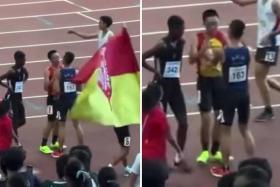Hwa Chong boy exempted from year-end exams says it's no big deal
While most secondary school students have their noses stuck in their books for their year-end exams, Koh Heer Ee is busy leafing through research papers.
The Hwa Chong Institution (HCI) Secondary 3 student was exempted from his year-end exams for all seven core subjects, so he spent the time preparing for the Singapore Youth Physicists' Tournament.
An HCI spokesman said it is the school's policy to exempt Secondary 1 to 3 students who consistently do well - 80 per cent for all tests and assignments - from the year-end exams.
Heer Ee, 15, received a letter in September saying that he was exempted from all his core subjects.
He was still required to sit for higher papers because he is part of the Science and Math Talent Programme, but his feat turned him into an overnight celebrity of sorts.
A photo of the letter, posted by a friend on Heer Ee's Facebook wall as a joke, went viral when one of his seniors, Matthew Boo, took it to Twitter.
The tweet, with a picture of the letter, has been re-tweeted more than 2,700 times. It has even made it to spoof site SGAG, with more than 7,000 likes on its Facebook page and close to 2,000 shares.
This newfound fame earned Heer Ee the label of "Heergod" from his peers. Friends came up with puns on his name, like "Heer me pray" and some even started - as a joke - "worshipping" at the "Shrine of Koh Heer Ee", which is really a cardboard box with his picture and his letter of exemption.
While Heer Ee plays along and "blesses" those who do that, he wonders what the fuss is over this exemption.
"I'm planning to just let them be, until the hoo-ha dies down naturally," he said.
It is not uncommon for students to be spared from end-of-year exams, and he has done without year-end papers for a few of his subjects previously, he told The New Paper on Wednesday.
PASSIONATE
"I just did my best for the subjects. I was quite passionate about my sciences. Getting exempted from exams is just a by-product," he said.
"There is no secret. It's really just about getting the basics right, paying attention in class."
He thinks the reason he has improved by leaps and bounds - from being exempted from just one or two subjects in Secondary 1 and 2 to being exempted from seven - is the pedagogy employed by the teachers in Secondary 3.
"It made me take an interest in reading and researching, so I spent more time in the library watching documentaries," he said.
"I read just about anything under the sun and that really helps me draw parallels to the subjects I study."
Reiterating that his achievement is simply part of a school policy, he said: "It's honestly nothing much. I only excel in academics. There are many other fields that I have yet to excel in."
On Wednesdays and Fridays and on weekends, he hangs out with his close friends from his co-curricular activity, the National Police Cadet Corps.
He works on his schoolwork on the other days.
His peers attested to his intelligence, but pointed out that it was also his diligence that paid off.
Owen Cho, who was Heer Ee's classmate for two years, told TNP: "He is a very hard worker. You would hardly find him gaming during the school term.
"I think it is more that he has both intelligence and diligence, which enabled him to excel at his subjects."
Adding that there is a "culture of worshipping" in HCI, Owen, 15, said: "Most students who excel in their fields receive 'worship' from their friends as well.
"It just so happened that Heer Ee managed to attain what is considered the ultimate achievement in the academic field and thus became a celebrated character."
Though reaction to his achievement has been largely positive, he was not spared unkind comments by some netizens on the SGAG Facebook page.
Facebook user Axtalia LeBendo Jessixa wrote: "How much did he pay? Who got bribed?"
Another Facebook user Teo Tze Han wrote: "How much did that cost?"
On such remarks, Heer Ee is indifferent.
"I just ignore them," he said.
"There is no secret. It's really just about getting the basics right, paying attention in class."
- Hwa Chong Institution student Koh Heer Ee, 15
No need for exam if student has learnt well
The exam exemption policy at Hwa Chong Institution (HCI) is sound as it caters to both fast learners and those who need more time, said pedagogy expert Dr Yeap Ban Har.
"If a teacher has ample data, then there is no need to go and get more just because it is the done thing," said the principal at Marshall Cavendish Institute, which carries out teacher training.
"Why subject the student to another test when there is already ample data that the student has learnt well?"
Similarly, a student who needs more time to absorb the lesson content can still do well in the year-end exams, which make up 70 per cent of the final exam grade, Dr Yeap, 45, added.
At HCI, Secondary 1 to Secondary 3 students can be exempted from their year-end examinations if they consistently hit 80 per cent for their term tests and assignments.
These tests and assignments make up 30 per cent of their final grade, while the year-end exams form the remaining 70 per cent.
If exempted from the year-end exams, students are automatically graded a distinction for that subject.
Sec 4 students are not eligible for this exemption. They either sit their year-end exams or, for those who did badly in Sec 3, take their O-level exams.
LONG-STANDING
An HCI spokesman said this is a "long-standing exemption policy for students who have performed exceptionally well throughout the year".
Those exempted can then dedicate more time to research and community projects.
He added that it is based on the school's belief that education should not only foster academic excellence but, more importantly, nurture passionate individuals who will "serve the wider community".
A spokesman for the Education Ministry said that schools need to "exercise professional judgment" when it comes to such policies.
"Assessments are an integral part of learning used to assess a child's mastery in his learning, identify his or her strengths as well as areas for improvement. It would also help schools determine whether students have attained the necessary academic foundation to cope with their next level of learning.
"School examinations are one form of assessment, but there can be other forms of assessments. There can be exceptional circumstances when students are unable to sit for the school examination, for example due to medical reasons or family emergencies." he said.
Dr Yeap, who taught at the National Institute of Education for more than 10 years, agreed.
"Examination is to assess learning. There are many ways to get assessment data on learning and examination is one of them," he said.
Get The New Paper on your phone with the free TNP app. Download from the Apple App Store or Google Play Store now






